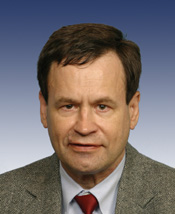
Lane Evans
Photo from Wikimedia Commons / Author of Photo: United States GovernmentOverview
* Former Democratic Member of Congress
* Former Member of the Progressive Caucus
* Co-sponsored a bill to ease trade restrictions against the Communist dictatorship in Cuba
* Sat on the House Armed Services Committee
* He died in a nursing home on November 5, 2014
Lane Evans was born in Rock Island, Illinois in August 1951, the son of a union firefighter. He served in the Marine Corps from 1969-71, then earned his undergraduate degree at Augustana College in 1974, followed by a Juris Doctorate at Georgetown University in 1978. After completing his formal education, Evans worked four years as a legal services lawyer. In 1982 he launched his 25-year political career when he was elected, as a Democrat, to represent the 17th Congressional District of Illinois. His campaign received strong support from Democratic Socialists of America (DSA) members Monty Tarbox and Bob Van Meter.
In 1985 Evans was the keynote speaker at the Chicago DSA’s annual Eugene Debs/Norman Thomas/Michael Harrington dinner banquet — named in honor of three prominent American socialists) — honoring DSA member Vicky Starr. Evans went on to attend many subsequent Debs-Thomas-Harrington dinners in the years that followed.
In 1995 Evans learned that he had developed Parkinson’s Disease, but he did not announce the diagnosis publicly until three years later.
In 2003, Evans — who fervently opposed the North American Free Trade Agreement (NAFTA) and most other trade-expanding arrangements — co-sponsored a bill to ease trade restrictions against Fidel Castro‘s Communist dictatorship in Cuba.
In late 2003, Evans played a key role in advancing the political career of then-State Senator Barack Obama, bringing the latter, who was preparing to run for the U.S. Senate, to his (Evans’s) downstate congressional district to introduce him to the voters there. Five years later, when Obama won the White House in November 2008, Evans joined the new president and his closest friends and advisors in Chicago to watch the election returns on television. Obama reportedly told Evans that “I wouldn’t be here if it wasn’t for you.”
Evans served a stint on the House Armed Services Committee and was the ranking member of its Veterans’ Affairs Subcommittee. He supported compensation for Vietnam War veterans who may have been harmed by exposure to the herbicide Agent Orange and who suffered from Post-Traumatic Stress Syndrome. Evans also sought to outlaw and remove land mines, including those protecting South Korea’s border with Communist North Korea, and those protecting the U.S. Naval Base at Guantanamo Bay in Communist Cuba.
Organized labor was by far the largest source of Evans’ political campaign money. Among his key supporters were the International Brotherhood of Electrical Workers, the United Auto Workers, the Association of Trial Lawyers of America (now known as the American Association for Justice), the American Federation of Teachers, the Service Employees International Union, the United Food & Commercial Workers International Union, UNITE HERE!, the National Education Association, and the AFL-CIO.
During his career as a lawmaker, Evans believed that:
- all women should have an unrestricted right to abortion-on-demand at any stage of pregnancy – subsidized by taxpayers, in cases of economic hardship;
- public and private employers alike should be legally required to implement affirmative-action hiring and promotion policies that give preference to African Americans and women, as compensation for historical injustices;
- the principle of church-state separation is inviolable and should preclude permitting prayer in the public schools, or the posting of the Ten Commandments in public places;
- the death penalty constitutes cruel and unusual punishment, and should be abolished;
- more guns in the hands of private citizens inevitably result in higher levels of crime, thus the availability of firearms should be restricted by whatever means are effective;
- the eventual implementation of a government-run, single-payer healthcare system would be highly desirable;
- voucher programs designed to enable low-income parents to send their children to private schools rather than to failing public schools, constitute bad policy because they rob the public schools of vital resources; and
- an ever-increasing reliance on “green energy” sources such as wind and solar should be put in place, along with the phasing out of fossil fuels, the imposition of carbon taxes, and the raising of vehicle CAFE standards.
Describing himself as a “populist,” Evans was a member of the Congressional Progressive Caucus in the House of Representatives.
For an overview of how he voted on a variety of key issues during his legislative career, click here.
At various times during the course of his professional life, Evans served as a board member with Illinois Public Action and Illinois Citizen Action, and as an advisory committee member with the Progressive Majority.
Due to the increasingly debilitating effects of Parkinson’s Disease, Evans retired from public life in January 2007. He died in a nursing home on November 5, 2014.
Additional Resources:
Further Reading: “Lane Evans” (Keywiki.org); “Lane Evans, Veterans Advocate in Congress, Dies at 63” (NY Times, 7-14-2014); “Evans Seeks Worldwide Ban on Land Mines” (Chicago Tribune, 6-25-1995); “Korean Mines Don’t Help” (NY Times, 9-10-1997); Lane Evans’s Positions on Key Issues (OnTheIssues.org).